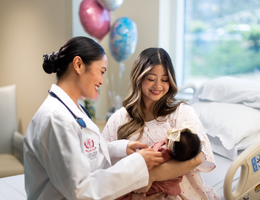

Low-dose aspirin, as recommended by a healthcare provider, is the only known effective solution to prevent preeclampsia.
Loma Linda University Children’s Hospital (LLUCH) is part of a statewide pilot program utilizing low-dose aspirin to prevent preeclampsia in pregnant women. The program is a joint initiative with four other hospitals and the California Maternal Quality Care Collaborative (CMQCC) funded by the March of Dimes.
“We are eager to help women who are at risk of preeclampsia — which is about 80% of our patient population in the Inland Empire,” said Courtney Martin, DO, medical director of maternity services and quality improvement. “Data show that a low-dose aspirin regimen is safe and effective for expecting moms and reduces the risk of developing preeclampsia and, subsequently, the risk of premature delivery. It's important for pregnant women to know their options for a safe and successful pregnancy.”
Preeclampsia is a serious disease during pregnancy where high blood pressure and other complications can put the baby and pregnant person at risk. Low-dose aspirin, as recommended by a healthcare provider, is the only known effective solution to prevent preeclampsia.
Preeclampsia is one of the most serious health problems that affects about 4% of pregnancies in the United States and accounts for 6% of preterm births. Black birthing individuals are at greater risk for developing preeclampsia due to heightened experiences of racism, further exacerbating disparities in maternal health outcomes. At LLUCH, approximately 30% of patients who deliver have hypertensive disorders in pregnancy.
This project is a collaboration between hospitals, clinics, and community-based organizations dedicated to preventing preeclampsia by identifying and implementing patient-centered solutions that promote the use of daily low-dose aspirin. This project will enhance partnership, synchrony, and collaboration across all stakeholder groups. All groups have an invested interest in the success of equitable solutions for all those impacted or who might someday be impacted by preeclampsia.
“Clinical interventions alone are not enough to close gaps in maternal health disparities. This project elevates community partners and patient experiences in the quality improvement process to establish connections between hospitals and the communities they serve,” said Leslie Kowalewski, administrative director at CMQCC. “This collaboration will result in a long-term, sustainable, and holistic approach to strengthening maternal healthcare in California and beyond.”
Contact your OB/GYN or learn more about maternity services available online.

